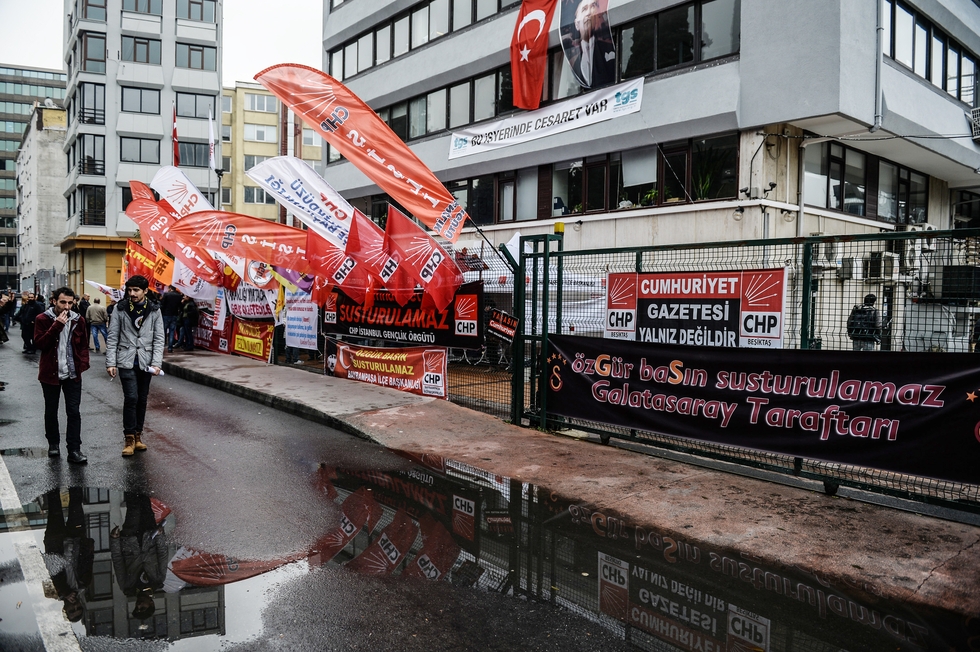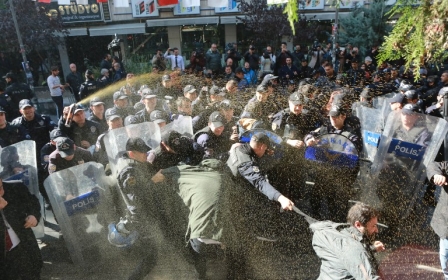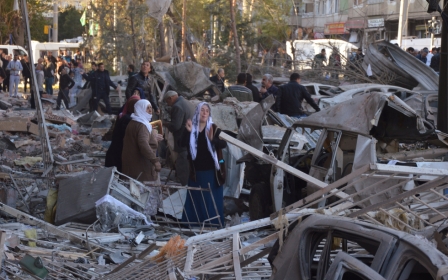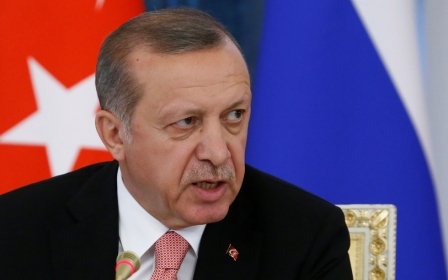Turkish court jails 9 staff of opposition daily

An Istanbul court on Saturday ordered the imprisonment of nine staff from the opposition Cumhuriyet newspaper, in an intensifying crackdown a day after the leaders of the country's main pro-Kurdish party were also jailed.
The arrests added to growing international alarm over the use of a state of emergency, implemented in the wake of the failed 15 July coup, against critics of Turkish President Recep Tayyip Erdogan.
The Cumhuriyet staff detained earlier this week, including some of the most prominent names in Turkish journalism, will now be held behind bars ahead of a trial, a date for which had yet to be set.
Nine MPs from the opposition pro-Kurdish People's Democratic Party (HDP), including its co-leaders Selahattin Demirtas and Figen Yuksekdag, were also jailed ahead of trial by the courts Friday on terror charges.
At total of 13 staff from Cumhuriyet had been detained in raids on Monday in a swoop that amplified concerns about press freedoms in Turkey.
Among the nine ordered held ahead of trial were Cumhuriyet's editor-in-chief Murat Sabuncu, celebrated cartoonist Musa Kart, and influential anti-Erdogan columnist Kadri Gursel.
However, columnists Hikmet Cetinkaya and Aydin Engin were released on judicial control due to age and on the grounds of health, the reports said, while two other suspects from the accounts department were released without charge.
The suspects are charged with links to the militant Kurdistan Workers' Party (PKK) and the movement of US-based preacher Fethullah Gulen, who is blamed for the failed coup attempt. Gulen denies the accusations.
'Worrisome trend'
Cumhuriyet has for months been in the crosshairs of the Turkish authorities. Earlier this year former editor-in-chief Can Dundar was given a five years and 10 months jail sentence for revealing state secrets in a front-page story. He was subsequently freed following his trial pending an appeal.
An arrest warrant has also been issued for Dundar in the current case but he has quit Turkey for Germany.
"Our 'crime' is our writing, our headlines, our news. We will write again. We will write even more," Dundar wrote on Twitter.
Demirtas and Yuksekdag, meanwhile, spent a first night behind bars after their arrest on Friday.
Although their hearings took place in the southeastern city of Diyarbakir, both were flown to prisons in the west of Turkey well away from their strongholds in the east.
Demirtas is now in prison in Edirne province close to the Greek and Bulgarian borders while Yuksekdag was taken to Kocaeli just east of Istanbul, reports said.
After his arrest, Demirtas said in a written statement read by his lawyer that he was the victim of a "civilian coup by the government and the palace".
Dogan news agency showed dramatic footage of Demirtas arriving in Edirne province on a helicopter which landed in the middle of an athletics field before he was taken to prison in a multi-vehicle convoy.
Their arrest along with those of the seven other HDP MPs, on various charges of membership of the PKK and making "terror propaganda" for the group, sparked immediate alarm among Turkey's Western allies.
EU foreign policy chief Federica Mogherini said she was "extremely worried" over the detentions while US State Department spokesman John Kirby said there was a "worrisome trend" of limiting freedom of expression in Turkey.
IS said to claim attack
The jailing of the HDP MPs took place hours after a bomb attack in Diyarbakir outside a police headquarters killed nine people and wounded over 100.
The government immediately blamed the PKK for the attack. But the Amaq news agency, which is linked to the Islamic State (IS) group, said that its fighters were behind the bombing, the SITE Intelligence Group said. There has so far been no comment from the PKK.
With tensions escalating, the Turkish authorities sparked further controversy by slapping restrictions on social media and messaging services like WhatsApp.
Users were still encountering problems loading social media on Saturday and were also using virtual private network (VPN) connections, which people often use to circumvent such restrictions.
Kirby said that in a telephone call Deputy Secretary of State Antony Blinken told Turkish foreign ministry number two Umit Yalcin that "restricting the Internet undermines confidence in Turkey's democracy and economic prosperity".
New MEE newsletter: Jerusalem Dispatch
Sign up to get the latest insights and analysis on Israel-Palestine, alongside Turkey Unpacked and other MEE newsletters
Middle East Eye delivers independent and unrivalled coverage and analysis of the Middle East, North Africa and beyond. To learn more about republishing this content and the associated fees, please fill out this form. More about MEE can be found here.




